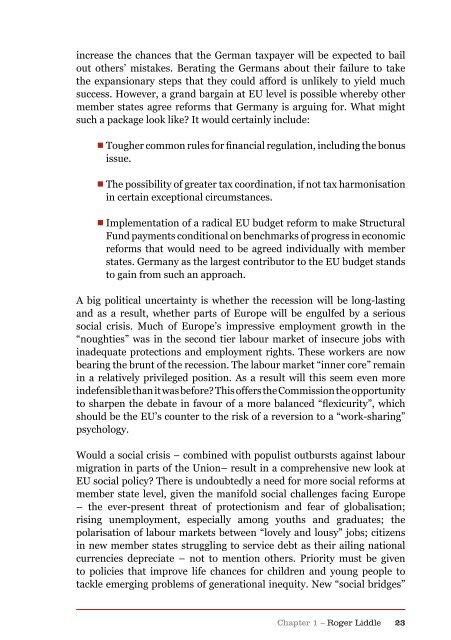Authors Iain Begg | Gabriel Glöckler | Anke Hassel ... - The Europaeum
Authors Iain Begg | Gabriel Glöckler | Anke Hassel ... - The Europaeum
Authors Iain Begg | Gabriel Glöckler | Anke Hassel ... - The Europaeum
Create successful ePaper yourself
Turn your PDF publications into a flip-book with our unique Google optimized e-Paper software.
increase the chances that the German taxpayer will be expected to bail<br />
out others’ mistakes. Berating the Germans about their failure to take<br />
the expansionary steps that they could afford is unlikely to yield much<br />
success. However, a grand bargain at EU level is possible whereby other<br />
member states agree reforms that Germany is arguing for. What might<br />
such a package look like? It would certainly include:<br />
n Tougher common rules for financial regulation, including the bonus<br />
issue.<br />
n <strong>The</strong> possibility of greater tax coordination, if not tax harmonisation<br />
in certain exceptional circumstances.<br />
n Implementation of a radical EU budget reform to make Structural<br />
Fund payments conditional on benchmarks of progress in economic<br />
reforms that would need to be agreed individually with member<br />
states. Germany as the largest contributor to the EU budget stands<br />
to gain from such an approach.<br />
A big political uncertainty is whether the recession will be long-lasting<br />
and as a result, whether parts of Europe will be engulfed by a serious<br />
social crisis. Much of Europe’s impressive employment growth in the<br />
“noughties” was in the second tier labour market of insecure jobs with<br />
inadequate protections and employment rights. <strong>The</strong>se workers are now<br />
bearing the brunt of the recession. <strong>The</strong> labour market “inner core” remain<br />
in a relatively privileged position. As a result will this seem even more<br />
indefensible than it was before? This offers the Commission the opportunity<br />
to sharpen the debate in favour of a more balanced “flexicurity”, which<br />
should be the EU’s counter to the risk of a reversion to a “work-sharing”<br />
psychology.<br />
Would a social crisis – combined with populist outbursts against labour<br />
migration in parts of the Union– result in a comprehensive new look at<br />
EU social policy? <strong>The</strong>re is undoubtedly a need for more social reforms at<br />
member state level, given the manifold social challenges facing Europe<br />
– the ever-present threat of protectionism and fear of globalisation;<br />
rising unemployment, especially among youths and graduates; the<br />
polarisation of labour markets between “lovely and lousy” jobs; citizens<br />
in new member states struggling to service debt as their ailing national<br />
currencies depreciate – not to mention others. Priority must be given<br />
to policies that improve life chances for children and young people to<br />
tackle emerging problems of generational inequity. New “social bridges”<br />
Chapter 1 – Roger Liddle 23

















